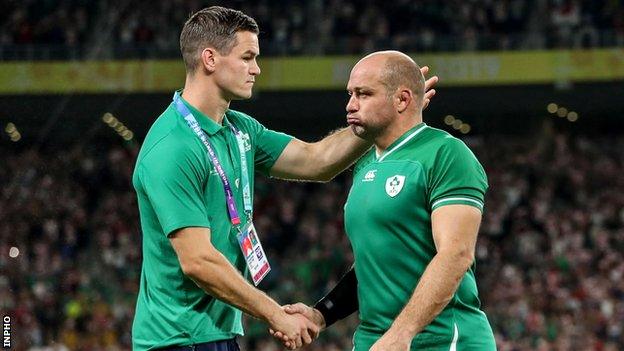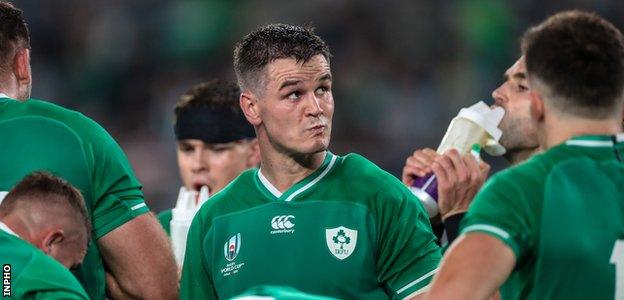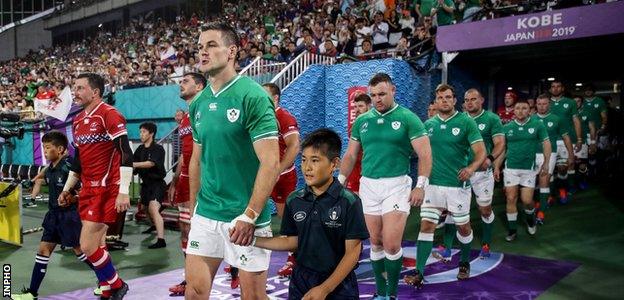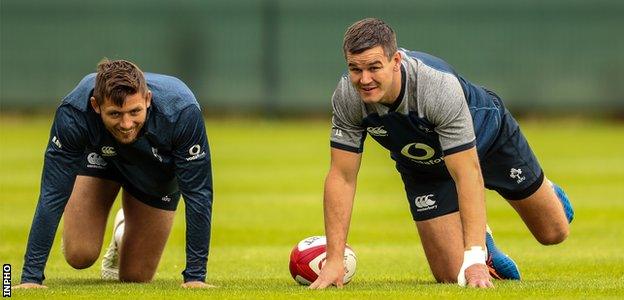Six Nations: Johnny Sexton more important to Ireland than ever
- Published
- comments

Sexton missed Ireland's World Cup defeat by hosts Japan with a quad injury
As a legion of fireworks set the Shizuoka sky alight, Ireland's beaten squad quietly trudged off the pitch knowing what was awaiting them.
In normal circumstances the defeat by World Cup hosts Japan would have prompted a forensic and immediate deconstruction of how and why Ireland had gone from the world's form side to the reluctant subjects of international rugby's most seismic result in four years.
Perhaps mercifully there was no time for such a dissection - that would have to wait until after the tournament.
As it was Ireland were faced with a five-day turnaround until their next game, knowing they were probably still in charge of their own destiny as far as reaching the quarter-finals was concerned.
And so in the absence of time, we turned to obvious explanations that could take us some way to understanding how Ireland had allowed themselves to be so thoroughly undone against Japan.
Of the two reasons that were immediately apparent, the first was that Japan were clearly a far better side than most onlookers had given them credit for.
Second was the lack of Jonathan Sexton.
Having sailed into an early two-score lead, Ireland surrendered control of proceedings and no-one in green was capable of wrestling it back. It was a situation crying out for the direction and composure of the injured Sexton.
What followed as Ireland scrambled to save face were two straightforward outings against Russia and Samoa.
From a purely selfish perspective they were the perfect matches for Sexton to return to. Even a violently off-colour Ireland would have been optimistic of comfortably doing a job against Russia.
But, opposition aside, Sexton's return hammered home the inescapable truth that with his presence comes a fluency and stability to Ireland's play that appears to go missing without him.
The pattern of Ireland's results and performances painted the narrative for the week leading into their quarter-final with New Zealand: Sexton had to be perfect just to give Ireland a puncher's chance.
The rest is history. Sexton was not perfect, he was not even close, and those 80 minutes in Tokyo still keep him awake at night.

Ireland were defeated 46-14 by New Zealand in the World Cup quarter-finals in Tokyo
It seems unfair to rest the fortunes of a team on the shoulders of one player, but the truth is that Sexton was the only hope Ireland had.
While back-up fly-half Jack Carty showed flashes of inventive brilliance, his inability to keep a lid on things against Japan put question marks over his ability to influence games at the top level.
Meanwhile Joey Carbery's injury-plagued World Cup was a microcosm of his professional career to date.
Of the many lessons Ireland will have learned from six chaotic and harrowing weeks in Japan, one of the most striking was the enduring importance of the 34-year-old playmaker.
As the Dubliner's reign as Ireland captain begins, is it a good thing that his performances, and his fitness, are more intertwined with Ireland's fortunes than they have ever been before?
No surprise in captaincy call
We do not know for how long, if at all, head coach Andy Farrell deliberated before appointing his captain.
Owing to his 88 caps and the guts of a decade as one of the team's leading voices, Sexton was the frontrunner for the position.
There was, however, a school of thought that suggested Farrell should be looking at a new four-year cycle and ought to select someone who is more likely to still be at the top of his game at the next World Cup in France, by which stage Sexton will be 38.
Most advocates of this approach pointed to second row James Ryan, who at 23 is perhaps the only player as certain of a starting place when fit as Sexton is.

Sexton has captained Ireland from the start only once, against Russia in Japan
However the new coach opted for the fly-half, and for that appointment there can be few complaints because the Farrell era begins just as the Schmidt era did, with Sexton as the key cog.
"Ireland play well when Johnny plays well," says former Ulster fly-half and BBC Radio Ulster pundit Ian Humphreys.
"There is no getting away from how important Johnny Sexton is."
With Carbery once again ruled out through injury and Carty omitted from the squad, Ulster's Billy Burns and Ross Byrne of Leinster are the other fly-halves at Farrell's disposal for the Six Nations.
Both have impressed this season for their provinces, but both are in the unenviable position of requiring experience on the international stage while finding themselves behind an almost un-droppable starter.
"I wouldn't go as far as to say it's a concern," says Humphreys.
"There are plenty of guys and I think it's just a case that they'll need more exposure.
"OK there's not anyone who has ripped it up at international level yet but I think it's only a matter of time and opportunity.
"Sexton will be good for another couple of years, and by that time a few of the boys will be ready to come through."
'With opportunities come experience'
Ireland open their campaign on Saturday against Scotland, where Byrne has been selected as the replacement fly-half.
With three home games to come in this year's tournament against Scotland, Wales and Italy, Farrell may look to use the schedule to offer Byrne and Burns some international exposure.
"It's all about trying to get 20 minutes here and there, potentially having the confidence, without being arrogant, that when you have Italy at home you make a couple of changes," Humphreys says.

Ross Byrne has been named as replacement fly-half for Ireland's Six Nations opener against Scotland on Saturday
"But it's not a case of making 15 changes because then it becomes very difficult.
"When the games are still in the balance, that's when you'll see the development and the guys coming to terms with international rugby.
"You see at Leinster, they don't always have to start with Tadhg Furlong because now they're so comfortable with Andrew Porter, and that has only come because he has been exposed to top-level rugby regularly.
"It's having that confidence that, ok maybe once or twice it won't work out, but have the confidence in the guys wearing the shirt. "
"With opportunities come experience and the confidence in the players around them."